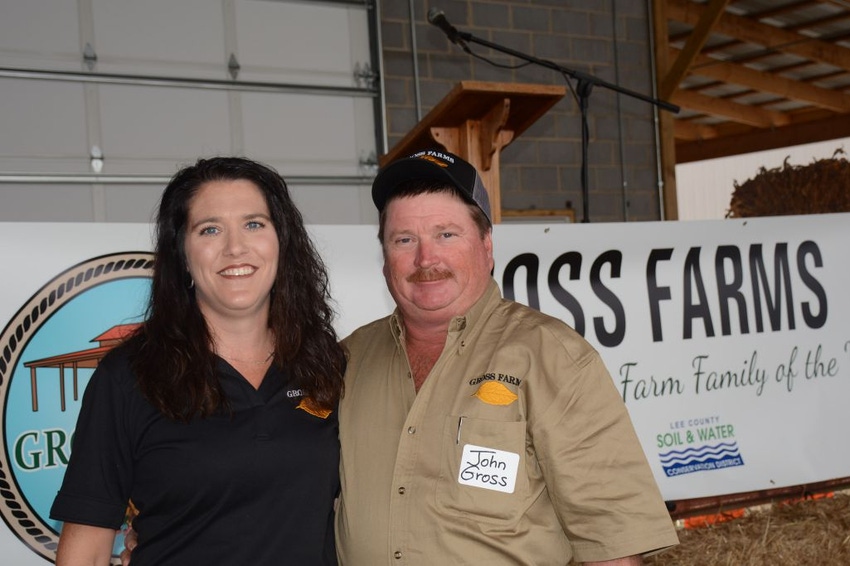
Gross Farms commitment to conservation is impressive and enduring
Each year since1987, John and Tina Gross have continually updated their conservation plan as crop rotations changed and new farms were acquired.Their longtime commitment to conservation has garnered them the 2016 North Carolina Outstanding Conservation Farm Family award presented by the North Carolina Association of Soil and Water Conservation Districts.

John and Tina Gross developed their first conservation plan nearly 30 years ago to improve soil and water quality on their tobacco farm in Lee County, N.C.
Each year since then, they have continually updated their conservation plan as crop rotations changed and new farms were acquired. Their longtime commitment to conservation has garnered them the 2016 North Carolina Outstanding Conservation Farm Family award presented by the North Carolina Association of Soil and Water Conservation Districts.
“In 1983 when I was started out with three acres of tobacco, I didn’t think it would come to this. I’ve been real lucky to do what I’ve been doing for the past 32 years, and I feel very blessed to have a family like I have to help me with it. I want to thank my wife because she’s probably one of my biggest assets. I’m the gas and she’s the brakes. We’ve been blessed with good employees and a good family,” Gross said in accepting the award at a ceremony on his farm near Sanford Oct. 8.
The award recognizes Gross Farms for outstanding stewardship of the state’s natural resources through conservation, education and implementation of best management conservation practices. Area and regional winners compete for the statewide honor with input from Soil and Water Conservation Districts, North Carolina State University, federal and state agencies and farm organizations.
“Gross Farms is able to thrive because of three reasons,” said State Rep. Brad Salmon, who represents Lee County in the North Carolina House of Representatives, at the awards ceremony. “First, they embrace modern agricultural practices. Second, they have a fearless vision for growth and success. Third, they have a tireless commitment to community relationships and leadership, Simply put, Gross Farms gives back.”
In recent years, Gross Farms has installed more than six acres of grassland waterways, 11,200 feet of terraces and 1,800 feet of diversions in Lee and Hartnett County through cost-share and technical assistance programs. In addition to structural practices, conservation tillage, long-term no till and sod-based rotations have been implemented. Since 2014, 337 acres of mixed cover crops have been used to improve residue cover and improve soil health.
“John does a lot of conservation stuff you can't see, like pest management, nutrient management, grid and soil sampling,” said Darryl Harrington, district conservationist with Lee County Soil and Water Conservation District at the ceremony. “John looks over the land like it needs to be, if it's the right thing to do, it's what he needs to do.”
Grid sampling is an important part of their management and the family has used precision sprayers since 2008. Through the Conservation Stewardship Program, more than 270 acres have been managed through the use of low drift nozzles and lower spray pressure to reduce pesticide use.
Gross Farms has expanded significantly since John began farming three acres of tobacco with his father in 1983. Since then, the farm has grown to include 1,700 acres of row crops, including conventional and organic tobacco, soybeans and small grains as well as 25 acres of produce and 150 acres of forestry.
“There is a lot of history at Gross Farms. You can’t be a Gross without knowing the Gross family history,” said Tina Gross. “We mainly grew row crops up until 2000 when there was a need for diversification when we started growing strawberries, you pick strawberries and pumpkins. In 2002, John’s sister Kathy and her family and his brother Bill and their family and our family all joined together to start Gross Farms Pumpkin Patch and Corn Maze, and it really took off.”
Gross Farms is a true family farm with John and Tina’s four children, Cody, Makalya, Colton and Kassidy all involved, in addition to several full-time, part-time and seasonal workers. Agritourism is a key part of the operation. In the spring of 2017, they will open their farm to the North Carolina Farm Bureau Ag in the Classroom Strawberry Workshop for area teachers to help them with lesson plans and teaching information for school tours.
“Gross Farms truly believes that our future lies with those coming behind us and that we need to do all we can to educate them about agriculture and how our food is grown,” Tina says.
About the Author(s)
You May Also Like





